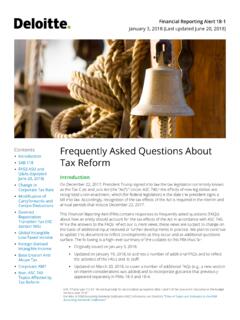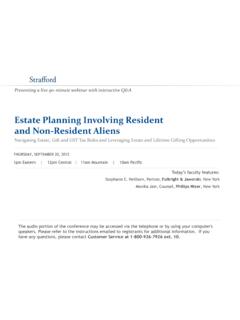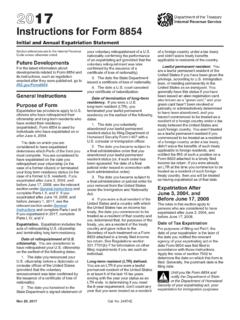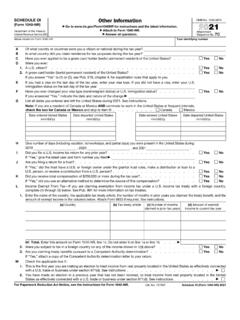Transcription of US estate and gift tax rules for resident and nonresident ...
1 US estate and gift tax rules for resident and nonresident aliensUS estate and gift tax rules for resident and nonresident aliensCopyright 2019 Deloitte Development LLC. All rights the potential tax implications? This publication answers the questions we hear most often from non-US citizens who live, work, or own property in the United and nonresident aliens may be in the US indefinitely, for a long-term stay, or for a short-term assignment. Upon their death, however, their estates may face adverse US estate tax consequences without careful planning. Likewise, lifetime transfers by non-US citizens may be subject to US gift and domicile considerations2US estate and gift taxes4 Generation-skipping transfer tax facts8 Thinking ahead9US estate and gift tax rules for resident and nonresident aliensCopyright 2019 Deloitte Development LLC.
2 All rights 2018, US citizens and US domiciliarieshave been subject to estate and gift taxation at a maximum tax rate of 40% with an exemption amount of $10 million, indexed for inflation. The indexed exemption amount for 2019 is $11,400,000. In contrast, non-US domiciliariesare subject to US estate and gift taxation with respect to certain types of US assets, also at a maximum tax rate of 40% but with an exemption of $60,000, which is only available for transfers at card statusObtaining a green card is one way to establish US residency. Having a green card may allow for easier travel into and out of the country and may allow you to remain in the US indefinitely.
3 However, holding a green card subjects you to US income tax on your worldwide income during the entire time that you hold the green card (even if you are living outside the US), and it is one factor considered when determining whether you are a US domiciliary. An individual who is considered domiciled in the US for estate and gift tax purposes is subject to US estate and gift tax on worldwide your green card will cause you to be considered a nonresident alien for US income tax purposes. This status assignment is based upon the assumption that you do not spend substantial time in the US after surrendering your green card, in which case you may become a US resident under the substantial presence test.
4 Upon surrendering your green card, you will need to consider whether you are subject to the US expatriation tax or exit tax. Residency and domicile considerationsThe substantial presence testIt is recommended that you retain records regarding your days inside and outside the US to support whether or not you meet the substantial presence test. The IRS defines substantial presence as being physically present in the United States on at least: 31 days during the current year, and 183 days during the 3-year period that includes the current year and the 2 years immediately preceding the current year, by adding together the following.
5 All the days you were present in the US in the current year, and 1/3 of the days you were present in the US in the first year before the current year, and 1/6 of the days you were present in the US in the second year before the current estate and gift tax rules for resident and nonresident aliensCopyright 2019 Deloitte Development LLC. All rights as a US domiciliaryResidency and domicile considerationsA person is considered to be domiciled in the US for estate and gift tax purposes if he or she lives in the US and has no present intention of leaving. Determining domicile for US estate and gift tax purposes is different than determining US income tax residence (see page 2).
6 Thus, you may be a resident for income tax purposes, but not US domiciled for estate and gift tax and circumstances testTo determine whether you are a US domiciliary, the following factors are considered: Statement of intent (in visa applications, tax returns, will, etc.) Length of US residence green card status Style of living in the US and abroad Ties to former country Country of citizenship Location of business interests Places where club and church affiliations, voting registration, and driver licenses are maintainedA person is considered a non-US domiciliary for estate and gift tax purposes if he or she is not considered a domiciliary under the facts and circumstances test described above.
7 It is possible that two or more countries will consider the same person a domiciliary, and/or that certain assets may be subject to estate or gift tax in more than one domicile for US estate and gift tax purposes is different than determining US income tax : Consult with a tax professional regarding your US domicile is important to consult with an international estate planning professional to determine your potential US estate tax exposure, to eliminate or reduce double taxation, and to plan estate and gift tax rules for resident and nonresident aliensCopyright 2019 Deloitte Development LLC.
8 All rights with estate and gift tax treatiesUS estate and gift taxesAs of January 2019, the US has entered in to estate and/or gift tax treaties with 16 jurisdictions. Tax treaties may define domicile, resolve issues of dual-domicile, reduce or eliminate double taxation and provide additional deductions and other tax with whom the US currently has gift and/or estate tax treatiesTo and quantify your worldwide assets and US situs tangible and intangible *DenmarkFinlandFranceGermanyGreeceIrelan dItalyJapanNetherlandsNorwaySouth AfricaSwitzerlandUnited Kingdom*Through the income tax treatyUS estate and gift tax rules for resident and nonresident aliensCopyright 2019 Deloitte Development LLC.
9 All rights tax factsUS estate and gift taxesAssets subject to US estate taxUS domiciliariesare taxed on the value of their worldwide assets at death in the same manner as US citizens. Non-US domiciliariesare taxed only on the value of their US situs assets. US situs assets generally include real and tangible personal property located in the US, business assets located in the US, and stock of US corporations. The definition of US situs assets may be modified by an applicable estate and gift tax rates and creditsEstate and gift tax rates currently range from 18% -40%. The rates are the same whether you are a US citizen, US domiciliary, or non-US domiciliary.
10 Applicable credit amounts are available against gift tax and estate tax for US citizens and domiciliaries, equivalent to $11,400,000 of value in 2019. An exemption of $60,000 is available against the value of assets includable in the US taxable estate of an individual who was not US addition to the Federal estate and gift tax, there may be additional state estate and gift owned propertyIf the surviving spouse is not a US citizen, in general, the portion of jointly owned property that is taxed in the estate of the first spouse to die is based upon who provided the consideration to purchase the property ( whose assets were used to purchase the property).













